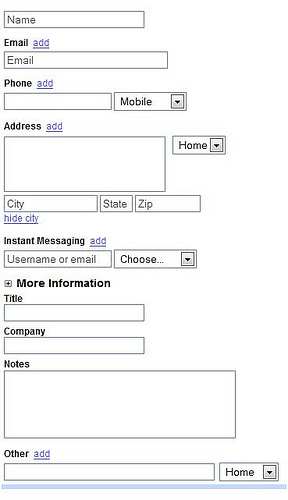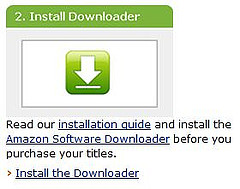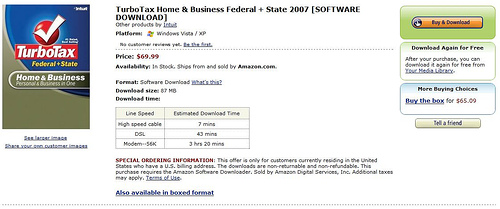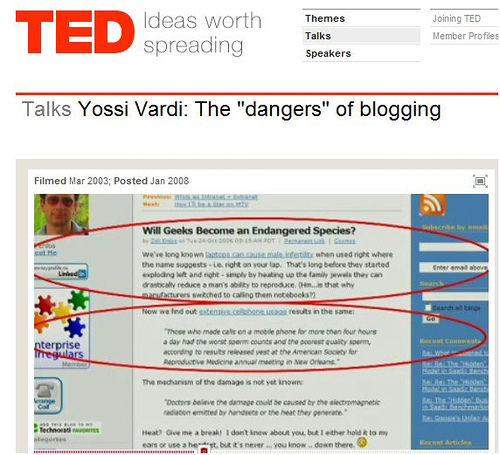Oh, TechMeme has its ways of creating some fun… On the left are the odes of how Holy Apple changed the entire wireless industry. The untold story . Too bad it got juxtaposed with the much less cheerful story of a customer being denied warranty for having downloaded a custom ringtone.
. Too bad it got juxtaposed with the much less cheerful story of a customer being denied warranty for having downloaded a custom ringtone. 

How the iPhone Blew Up the Wireless Industry … and Customer Service

Election Humor
Techmeme’s political sister-site, Memeorandum is full of speculation on how the New Hampshire polls could be so wrong. As usual, conspiracy theories abound, amongst them speculation on the role Diebold’s voting machines played in the results. I’m not joining the speculation, nor can I completely ignore it; after all, we’re hearing about voting machine problems all the time, several states decertified them… but I simply don’t have enough facts to take sides in this debate (although I wrote about the issue in the past) That said, a little laugh does not hurt … and you have to admit these posters are just hilarious:




There’s more where they come from: Diebold Variations, (c)2004-06 Rand Careaga/salamander.eps.

Gmail Contact Manager Does Not Support URLs?
 I find it hard to believe…so much so that I ask everyone to open my eyes: what am I missing here? Gmail’s Contact Manager (the new one) allows you to capture the typical data like email, phone, address, photo ( a great plus!), IM, but there’s no field to capture homepage addresses! (???).
I find it hard to believe…so much so that I ask everyone to open my eyes: what am I missing here? Gmail’s Contact Manager (the new one) allows you to capture the typical data like email, phone, address, photo ( a great plus!), IM, but there’s no field to capture homepage addresses! (???).
You can add as many fields as you like, but only of the pre-defined types, and if you use the Notes field to enter websites, they don’t become clickable URLs.
Of all companies on Earth, Google is the last one I would expect to NOT care about capturing web information…
Update: Charlie “Spanning” Wood adds:
…worse yet, it uses one big blob for mailing address instead of having fields for address, city, state/region, postal code, etc.
And we wonder why it’s difficult to sync Gmail contact data…
Voyagerfan5761 adds that the ability to add custom fields, a handy feature supported in the earlier Gmail version is gone now, too.
Add to this the idiotic restriction that now you can only delete 20 contacts at a time, and one can really wonder if the new Contact Manager in Gmail is a step back in functionality – albeit with nicer boxes. 
(Oh, you wonder why you’d want to delete contacts? Because Gmail adds anyone you respond to as a contact, without the ability to change that default).

Amazon Pulls a Digital River + FaceBook
Tax-time is soon upon us, and for millions of Americans that means buying TurboTax again. Fastest way to get it? Download from Intuit. Cheapest way to get it? Buy at Costco.
Not anymore. This year the fastest AND cheapest way is to download it from Amazon. Yes, Amazon entered the software download business, although initially the only available products are the different TurboTax flavors.
The traditional, box-sale page points to the download version, claiming you will “save time and money by downloading” software. Well, not quite. The downloadable version of each product is priced to match the boxed product+shipping charges. This is a missed opportunity, there are obvious savings from not having to manufacture, ship and store a tangible product, so they could afford to create financial incentives to move more customers to the download option. (Note: “they” means both Amazon and TurboTax maker Intuit, which also offers the box and download at identical prices.)
 There’s one thing I really, really don’t like about this new Amazon service: before you can purchase anything, you need to download and install the “Amazon Downloader”, which in turn will download and install the actual product. Now, I don’t know about you, but I certainly am not buying software frequently enough to justify the need for a client, whatever benefits(?) this approach may offer. And of course once you install software, you know you’re in for a lifetime of endless updates…
There’s one thing I really, really don’t like about this new Amazon service: before you can purchase anything, you need to download and install the “Amazon Downloader”, which in turn will download and install the actual product. Now, I don’t know about you, but I certainly am not buying software frequently enough to justify the need for a client, whatever benefits(?) this approach may offer. And of course once you install software, you know you’re in for a lifetime of endless updates…
If you ever need to download your purchased software again, it’s available under a new section called “Your Media Library.” As Mashable’s Adam Hirsch discovered, this is a lot more than just a listing of your digital purchases: you can list all purchases from Amazon and other sources, adding your items by simply scanning their barcode through your webcam, Amazon will convert and import the information automatically . There are a number of ways to share all this with friends, start discussions, tag items, subscribe to your friends’ collections via RSS, and follow what’s hot at any time.
If you think this is all similar to FaceBook’s Beacon, that’s because it is. With a significant difference: Amazon’s version is entirely opt-in.
Related posts: Download Squad, Mashable, Windows Connected, Web Worker Daily.

Gmail Search is Slowing and Google Knows…
Perhaps the best thing Gmail has going for it is the power of search: the ability to instantly find everything. Except that instant is getting ..well longer and longer. And make no mistake, Google knows it, to the point that there is now a message recognizing the fact:

The Still working message comes up when you are waiting for search, stuck to the point that you can’t move away, stop the search …etc: your options are either wait it out, or close the browser/window. A Windows-like experience? 
Related posts: Simplified Guide to Importing All Your Archive Email Into Gmail

“Local Warming” – Quoted in a TED Presentation
Investor and prankster Yossi Vardi delivered a lecture @ TED (March 2007, Monterey, CA) on the dangers of blogging. Specifically, um, for men. Eagle-eyed Amit Agarwal spotted a glimpse of my earlier blog post, Will Geeks Become an Endangered Species? embedded in the presentation:
Here’s the full video , it’s 6 minutes 15 seconds long, and my 4 seconds of fame come at 2:12 
On second thought, this was my first 3 seconds of fame – explanation here. Ah, when I was young…
Update (4/5/07): The seeds of innnovation in danger …

One For All, All for One
 One for all, all for one. Modern-day “musketeers” don’t use swords anymore; they have the Belkin Rockstar instead.
One for all, all for one. Modern-day “musketeers” don’t use swords anymore; they have the Belkin Rockstar instead.
Connect, share, listen, even mix songs together.
Details on all the gadget-blogs: Gizmodo, CrunchGear, Blast Magazine, Boing Boing Gadgets and Engadget.


Why CEOs Should Watch MSNBC
The CEO of Traffic Power, a SEO firm using “black hat” tactics that got them kicked off Google, Yahoo and other search engines has more to worry then trying to get back on Google: he is in jail for allegedly running a housing foreclosure scam.
It’s not that rare to see CEOs arrested, just check out the search results.
I know what’s wrong: they don’t watch MSNBC enough.

Microsoft Decides You Don’t Need Your Old Data
Do you think old, archive data on your computers is safe? Think again. Or just re-define safe: so safe that you can’t access it yourself.
In it’s infinite wisdom Microsoft decided certain old documents, including those created by their own Word, Excel and PowerPoint may pose a security risk, so they decided to block them in Service Pack 3 to Microsoft Office 2003. SP3 came out in December September (thanks for the correction) so you may or may not have it yet. Here’s the “fun” part:
- There is no clear definition of what’s blocked: the easy one is PowerPoint, where anything before 97 is dead, but as for Word or Excel (let alone other, previously compatible programs), you have to rely on this cryptic description by MS.
- There is no warning whatsoever at the time of installing SP3
- Even if you know what’s coming, there’s no way to easily locate and convert what is about to become inaccessible on your computer. Disaster may hit months or years away, when you need to access an archive file, but can’t.
Now, before you shrug it off, remember, this isn’t simply abandoning users still running pre-historic versions of software; we’re talking about data files here. You may run the latest release of all applications and still have no reason to touch old documents. After all, that’s what an archive is all about – you *know* your documents are there and will be accessible, should the need arise at any time in the future.
Back in the 80’s and 90’s paperless office was a popular phrase but remained largely a dream, since a lot of information still originated in paper form. The balance has largely shifted since then: the few things I still receive in paper format either end in the waste-basket, or I quickly scan them trusting that with cheap storage and powerful search I will always be able to pull up anything I need. I am finally living in a largely paperless world. But Microsoft just violated that trust, the very foundation of going paperless. Of course I shouldn’t be entirely surprised, this coming from the company which previously decided that the safest PC is a dead PC.
Solution? Microsoft offers one, in this article: tinker with your Registry, an admittedly dangerous, and definitely not user-friendly operation. I prefer Wired’s alternative:
Naturally, there’s an alternative which is somewhat easier (and free): just grab a copy of OpenOffice which can handle the older file formats. Once you’ve got them open, now might be a good time to convert them to ODF documents lest Office 2017 decide to again disable support for older file formats.
And of course I wouldn’t be me if I didn’t point out that this, and many other headaches simply disappear when you ditch the desktop and move online. Web applications typically don’t have major new versions, they just get continually updated (e.g. Zoho updates all their applications every few weeks). When that’s not the case, like when Zoho Show 2.0 was released recently and it required updating the user documents, the service provider takes care of it. They work for you – you don’t care about program versions anymore, just have access to your data. Anywhere, anytime.
if I didn’t point out that this, and many other headaches simply disappear when you ditch the desktop and move online. Web applications typically don’t have major new versions, they just get continually updated (e.g. Zoho updates all their applications every few weeks). When that’s not the case, like when Zoho Show 2.0 was released recently and it required updating the user documents, the service provider takes care of it. They work for you – you don’t care about program versions anymore, just have access to your data. Anywhere, anytime.
Related posts: CNet, Ars Technica, Compiler , An Antic Disposition, AppScout, Security Watch, Download Squad, Blackfriars’ Marketing, Feld Thoughts. The winning title comes from The J-Walk Blog: Office 2003 Downgraded With Service Pack 3.
Update: Phil Wainewright brings up an entirely new aspect of this issue: Microsoft breaks the perpetual licence covenant.






Recent Comments